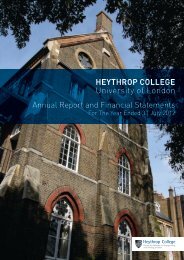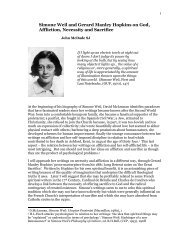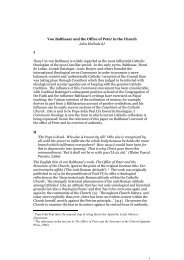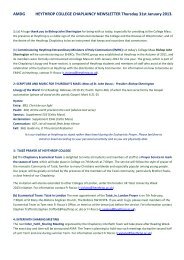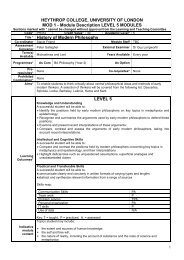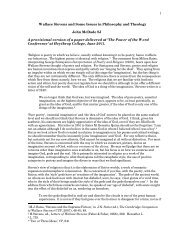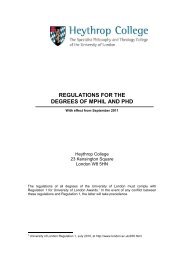December 2010: Edition 8 - Heythrop College
December 2010: Edition 8 - Heythrop College
December 2010: Edition 8 - Heythrop College
You also want an ePaper? Increase the reach of your titles
YUMPU automatically turns print PDFs into web optimized ePapers that Google loves.
Revelation in the world’s religion<br />
On 30th June <strong>Heythrop</strong> Alumni were pleased to welcome Reverend Professor Keith Ward to address the assembled members.<br />
Below we give two accounts of his talk reflecting the different ways in which his words challenged all of those present<br />
to consider the importance of revelation and religion in contemporary society<br />
4<br />
On Wednesday 30th June a large group of<br />
us attended a study evening at <strong>Heythrop</strong><br />
<strong>College</strong> on the above topic given by Rev.<br />
Keith Ward an Anglican priest. Dr. Ward<br />
began by posing this question. "Do we<br />
think that God is doing anything in the<br />
rest of the world that is not Christian"?<br />
He then went on with the following<br />
thoughts. It is inconceivable to think<br />
that a God who is Universal Love would<br />
exclude the other religions from<br />
Christian love. God wants everyone to<br />
be saved. Fulfill your human potential<br />
and love, intense love of God for all even<br />
our enemies and the whole of creation. I<br />
hope I will be saved. Who can be saved?<br />
He continued, saying in James we see<br />
that God wants everyone to be saved and<br />
in Vatican II it is written Muslims can be<br />
saved and of course atheists too. The<br />
Holy Spirit works in the hearts of his<br />
people. God is at work in the hearts of<br />
everyone. Jesus is presented as the<br />
Word, Wisdom of God. The Word is<br />
Eternal. It is embodied in the human<br />
person of Jesus. The Jesus we know is<br />
unique to each of us. As Christians we<br />
have the four Gospels where others tell<br />
us about Jesus. We have the words of<br />
God through Paul and human witnesses of<br />
the acts of God especially the<br />
Resurrection. What we see of Jesus is<br />
the life of the community. He then went<br />
on to say the Koran is the exact words of<br />
God as spoken to Mohammed. They<br />
cannot be changed. He then posed the<br />
question, what was going on in India and<br />
Japan? There was a religion there. There<br />
is a deep spirituality in India. God is at<br />
work there too. The Jews in their<br />
discussions love to disagree. Difference<br />
is part of the human condition. Dr. Ward<br />
began to conclude his lecture by saying,<br />
God is the God of Universal compassion,<br />
universal justice and love for the whole<br />
human race. God does not take<br />
vengeance. Love your enemies. God<br />
loves our enemies and wants us to do<br />
likewise. We do not know what God<br />
is. He wills good. He is unlimited,<br />
merciful. Everywhere God is revealing<br />
the Divine nature, God's unlimited love,<br />
icon of the invisible God. Every finite<br />
being is part of bliss, free from hatred,<br />
greed and ignorance. Nirvana,<br />
"extinction of individuality and<br />
absorption into the supreme spirit as the<br />
Buddhist highist good." The<br />
indescribable nature of compassion and<br />
bliss. It is another window on God.<br />
Different religions different windows into<br />
the mystery of God. If we want a fuller<br />
picture of God look at God at work in the<br />
different traditions. He ended by saying,<br />
"This was all said by Karl Rahner S.J." Of<br />
course this lecture was followed by a rich<br />
question and answer session where Dr.<br />
Ward's lively sense of humour shone<br />
through.<br />
Eileen McGrath<br />
Rev Prof Keith Ward<br />
In talking of earlier traditions than<br />
Christianity, such as the Hebrew Bible or<br />
even the Shamanistic, Professor Ward<br />
says that there is a marked similarity<br />
with shamanistic claims to possession by<br />
spirits or gods in visions and dreams<br />
which suggests that „any model of<br />
revelation should be broad enough to<br />
include the primal traditions, even<br />
though there is no written revelation in<br />
them‟. He concludes from a study of<br />
primal traditions, the view can be<br />
developed as a model of Divine<br />
revelation in terms of a persuasive, cooperative<br />
causality. The model of<br />
revelation which best seems to account<br />
for this picture is the model of God in<br />
the Hebrew Bible, despite the similarity<br />
with shamanistic claims to possession by<br />
spirits or god, a new prophetic belief in<br />
the existence of one holy, transcendent,<br />
personal agent-god which suggests an<br />
important discontinuity in the form of<br />
Divine revelation (Ward, 1994: 90,91).<br />
For Christians there is a simple personal<br />
relationship between God and the<br />
believer which enables the believer to<br />
see God in and within all things and<br />
experience the forgiveness of sin. The<br />
Hebrew tradition developed in<br />
competition with the fertility gods of the<br />
hostile powers of Egypt and Canaan and<br />
thus by exclusion of the many gods of the<br />
natural powers. It developed an ethical<br />
monotheism in which liberation was to<br />
be found in history, guided by a morally<br />
demanding and providentially acting God<br />
who spoke through a succession of<br />
prophets (Ward, 199:154).<br />
For the Hebrew view the world is created<br />
good, since it expresses the goodness of<br />
God. But it lies under judgement,<br />
because human self-will has destroyed<br />
the Divine plan. For the Indian view the<br />
world results from a fall into desire and<br />
ignorance. But it also manifests<br />
Brahman, since there is nothing else but<br />
Brahman. In place of judgement, one has<br />
the inescapable law of karma, which<br />
brings evil inevitably upon those who do<br />
evil. There is a difference between the<br />
Semitic moralism and the Indian nondualism,<br />
the former seeks a liberation<br />
from oppression and a return to „true<br />
nature‟ and the latter, liberation from<br />
the wheel of samsara and the realization<br />
of supreme bliss and wisdom. Professor<br />
Ward concludes:<br />
The idea of revelation as a Divinely given<br />
law of human and social fulfilment can<br />
be complemented by the idea of<br />
revelation as a teaching of the<br />
realization of personal unity with the<br />
one self-existent reality (Ward,<br />
1994:155).<br />
The classical Indian religious traditions<br />
developing out of the earlier primal cults<br />
results in a deeper morality of nonattachment,<br />
a search for spiritual<br />
integration, and a rational world-view<br />
which can include all the gods as forms<br />
of the one supreme, self-manifesting<br />
intelligence.<br />
Continued on page 5



